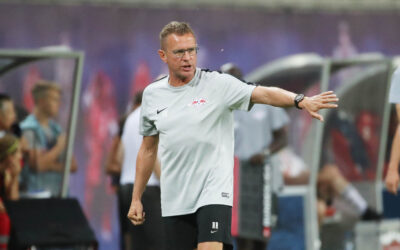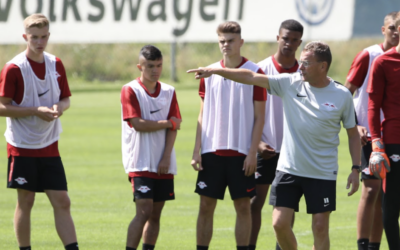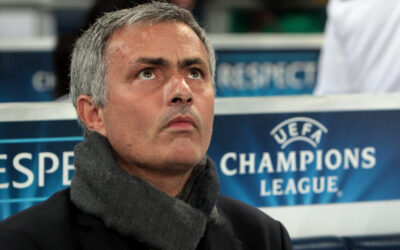At the World Cup, we are threatened with a duel that is darkly reminiscent of an earlier one. It took place in Gijon, at the 1982 World Cup against Austria. It was one of those games where you sit in the stands as a reporter and no longer believe what you see. A “crime scene” commissioner spontaneously advised handcuffs after the broadcast.
A few days ago, Jogi Löw told us that his friendship with the US national coach Jürgen Klinsmann is intact, but is on hold in the run-up to the approaching World Cup duel in Recife – “we haven’t had any contact lately,” the national coach revealed, “and probably won’t talk on the phone before the match.”
Now everyone is in suspense.
For suddenly a situation has arisen in which good friends could well pick up the phone to talk either about the Brazilian weather, the beautiful women there or the charms of a draw. The irresistible charm of such a draw would be that Germany and the USA would then be guaranteed a place in the last 16, where the Portuguese and Ghanaians could play as they like and be out, even if they drank a beer in a handstand at the kick-off circle without spilling it.
You don’t believe in such a scenario?
Neither do I. But journalistic due diligence compels me to recall that Dutch colleague who sat down next to me on 25 June 1982 before the World Cup preliminary round match between Germany and Austria in the “El Molinon” stadium in Gijon, Spain, and said: “They’ll come to an agreement.” It took me a lot of effort to convince him otherwise – that the Germans would take cruel revenge on the Viennese for the “disgrace of Cordoba” that had just happened four years earlier. And on the other side, goalkeeper Friedl Koncilia had threatened the day before: “We’ll send the Germans home.
The starting position was as follows: Germany had lost sensationally to Algeria and had only one win to their name, the Austrians had won both their matches, and there was only one result that would lift them both past the North Africans into the intermediate round – 1:0 for Germany. Horst Hrubesch scored that 1:0, in the eleventh minute.
“And now – watch,” said the Dutchman.
As one of the last surviving eyewitnesses to the inconceivable that followed, I’m afraid I must meekly admit that the rest of the 79 minutes went largely like this: the ball was pushed back and forth for minutes by both teams in their own half and, so that goalkeepers Schumacher and Koncilia didn’t fall asleep, occasionally played back to them. They would pick it up with their hands, which was still allowed in those days, walk around their penalty area for a while with the ball under their arms, then kick it forward, and then it was the opponent’s turn again. In short, there was a tacit agreement not to change the favourable result. The duels were only alibi, a shot on goal no longer seemed advisable for reasons of table, and everyone kept to it.
Except for Schoko.
Walter (“Schoko”) Schachner, the upright Styrian, actually tried to score the equaliser at one point and later complained bitterly: “I was running up front like a maniac and was really pissed off, because they didn’t play me.” He even managed to get a yellow card in his overzealousness. He was clearly the last to understand what was going on. Schachner said later: “During the break, a few important players from both teams, who got on well with each other, agreed to leave it at that. But I didn’t hear anything.”
Inevitably, this led to the legendary incident when Schoko broke the non-aggression pact and shot hard towards the German goal. Friend and foe alike were stunned and outraged. The German stopper Karlheinz Förster, as reliable ear-witnesses recall, pointed at his opponent Krankl on the spot with a “Hey, Hansi!” to such an extent that he threatened his teammate Schachner, furious: “Schoko, wannsd` dös no amol mochst…”
While the German TV commentator Eberhard Stanjek indignantly spoke of a “disgrace” and his Viennese colleague Robert Seeger called on the spectators to switch off, 40,000 indignant Spaniards in the stadium waved white handkerchiefs and shouted “Kiss yourselves!” Meanwhile, the Algerians, feeling like shit, waved banknotes, which drove Austrian delegation leader Hans Tschak to the lowest point of the day, saying afterwards: “Of course, today was played tactically. But if 10,000 desert sons want to cause a scandal in the stadium, it shows that they don’t have enough schools. Some sheikh comes from an oasis, gets a taste of the World Cup after 300 years and thinks he can open his mouth now.”
I won’t tell you anything new, but the score remained 1:0. The local newspaper “El Commercio” published the match analysis the next day in the police report, and another Spanish paper found what it was looking for in the rummage basket of German history and ran the headline: “El Anschluss”. All the more relaxed, Hansi Krankl said on behalf of all the players: “I don’t know what anyone wants. We are qualified.”
By the way, the Dutch colleague slapped me on the thighs with a grin at the final whistle. And from home, the news reached us in Gijon that same evening that ARD presenter Hans-Joachim Rauschenbach had asked his studio guest, Viennese “Tatort” commissioner Kurt Jaggberg, after the game: “What can you do?”
“Arrest everyone,” said the commissioner.




